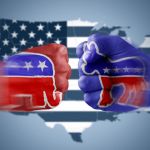This November, Americans are casting their ballot amid turmoil and uncertainty: a once-in-a-lifetime pandemic; a summer of civil unrest and a racial reckoning; disinformation and conspiracy theories muddying the media landscape; an economy rebounding in spurts; record-shattering weather and climate disasters.
Stanford research intersects with many of these issues that are troubling the nation and the world at large. From across the social and political sciences, humanities, science and medicine, scholars are applying their expertise to better understand how people, policy and democratic processes can come together to address them.
As Stanford political scientist Condoleezza Rice recently pointed out, while democracy “is hard,” it inspires change in a way that aligns itself to human dignity.
“I think if each and every one of us recognizes that democracy is not a spectator sport and that you have to commit yourself to being willing to play your own role, then the aggregated roles will come to mean something,” added Rice, director of Stanford’s Hoover Institution, who spoke at a session of Democracy Matters: Challenges Facing Democracy in the U.S., an ongoing webinar series that highlights challenges to democracy in the U.S. and around the world.
Here, Stanford scholars share what democracy and political change look like in the U.S. today, how to understand the attitudes of the American electorate, and the challenges posed to democratic processes, from the impact of the pandemic to political messaging.
Media Contacts
Melissa De Witte, Stanford News Service: (650) 723-6438, mdewitte@stanford.edu



















































